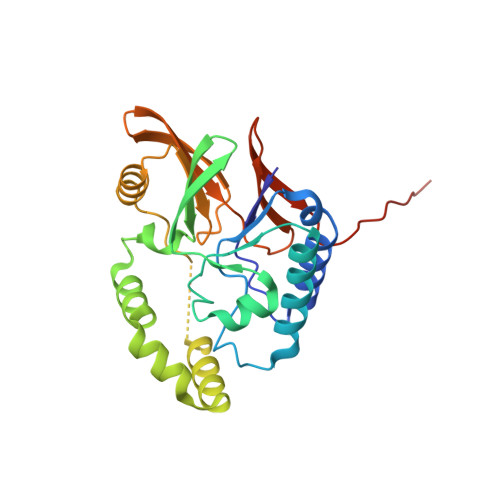Synthesis and evaluation of sulfonyl piperazine LpxH inhibitors.
Kwak, S.H., Cochrane, C.S., Ennis, A.F., Lim, W.Y., Webster, C.G., Cho, J., Fenton, B.A., Zhou, P., Hong, J.(2020) Bioorg Chem 102: 104055-104055
- PubMed: 32663666
- DOI: https://doi.org/10.1016/j.bioorg.2020.104055
- Primary Citation of Related Structures:
6WII - PubMed Abstract:
The UDP-2,3-diacylglucosamine pyrophosphate hydrolase LpxH is essential in lipid A biosynthesis and has emerged as a promising target for the development of novel antibiotics against multidrug-resistant Gram-negative pathogens. Recently, we reported the crystal structure of Klebsiella pneumoniae LpxH in complex with 1 (AZ1), a sulfonyl piperazine LpxH inhibitor. The analysis of the LpxH-AZ1 co-crystal structure and ligand dynamics led to the design of 2 (JH-LPH-28) and 3 (JH-LPH-33) with enhanced LpxH inhibition. In order to harness our recent findings, we prepared and evaluated a series of sulfonyl piperazine analogs with modifications in the phenyl and N-acetyl groups of 3. Herein, we describe the synthesis and structure-activity relationship of sulfonyl piperazine LpxH inhibitors. We also report the structural analysis of an extended N-acyl chain analog 27b (JH-LPH-41) in complex with K. pneumoniae LpxH, revealing that 27b reaches an untapped polar pocket near the di-manganese cluster in the active site of K. pneumoniae LpxH. We expect that our findings will provide designing principles for new LpxH inhibitors and establish important frameworks for the future development of antibiotics against multidrug-resistant Gram-negative pathogens.
- Department of Chemistry, Duke University, Durham, NC 27708, United States.
Organizational Affiliation:




















